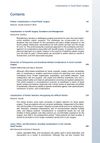 November 2013 in “Facial Plastic Surgery Clinics of North America”
November 2013 in “Facial Plastic Surgery Clinics of North America” The document concludes that careful techniques, proper patient selection, and management strategies are crucial to minimize complications in facial plastic surgery.
 1 citations,
December 2019 in “International journal of innovative technology and exploring engineering”
1 citations,
December 2019 in “International journal of innovative technology and exploring engineering” Fish scale-based organic hair oil and shampoo may improve hair health and prevent damage.
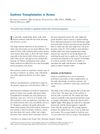 25 citations,
March 2009 in “Dermatologic Surgery”
25 citations,
March 2009 in “Dermatologic Surgery” Eyebrow transplantation can be successful for Asians with the right technique and care, but regular maintenance is necessary.
February 2022 in “Journal of pharmaceutical research international” The herbal baby shampoo is safe, cleans well, and promotes healthy hair.
 41 citations,
September 2014 in “JAMA Facial Plastic Surgery”
41 citations,
September 2014 in “JAMA Facial Plastic Surgery” Use finasteride, minoxidil, and follicular unit transplantation for hair loss treatment.
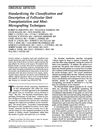 33 citations,
September 1998 in “Dermatologic Surgery”
33 citations,
September 1998 in “Dermatologic Surgery” Surgeons suggested a standard system for hair transplant methods to improve communication and results.
10 citations,
November 2013 in “African Journal of Traditional Complementary and Alternative Medicines” Herbal oils from Cuscuta reflexa help with hair growth, dandruff, and hair fall.
December 2010 in “Journal of Oriental Medicine” Black bean, wheat, and rice bran extracts can improve hair growth and quality.
January 2023 in “Applied sciences” Equisetum debile extracts may help with skin whitening, anti-wrinkle, and anti-hair loss treatments.
10 citations,
August 2021 in “Cosmetics” The best shampoo formula used 1% high-weight hyaluronic acid, 10% acidic sophorolipid, and 1% salt for effective hair conditioning and cleansing without sulfates or silicones.
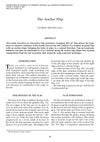 1 citations,
June 2001 in “International Journal of Cosmetic Surgery and Aesthetic Dermatology”
1 citations,
June 2001 in “International Journal of Cosmetic Surgery and Aesthetic Dermatology” The Anchor Flap is an effective, quick treatment for severe baldness but requires skilled surgeons and careful patient selection.
 22 citations,
May 2012 in “Dermatologic Therapy”
22 citations,
May 2012 in “Dermatologic Therapy” Doctors should suggest hair replacement based on personal needs and stress scalp cleanliness to avoid skin problems.
 5 citations,
January 2017 in “Elsevier eBooks”
5 citations,
January 2017 in “Elsevier eBooks” The document concludes that cosmetics need biocompatible, eco-friendly ingredients due to aging populations and demand for effective products.
September 1986 in “Journal of the American Academy of Dermatology” The conference covered topics like aging skin and acne therapy, with a highlight on steroid injections for alopecia areata.
 14 citations,
January 2016 in “Elsevier eBooks”
14 citations,
January 2016 in “Elsevier eBooks” Liposomes improve the delivery and effectiveness of cosmetic ingredients but face challenges like cost and stability.
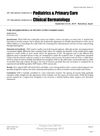 November 2019 in “Quality in primary care”
November 2019 in “Quality in primary care” Scalp micropigmentation is a tattooing method that can mimic a full head of hair without surgery and has no healing time.
 41 citations,
October 2000 in “Dermatologic clinics”
41 citations,
October 2000 in “Dermatologic clinics” Better hair care products are needed to protect against grooming and chemical damage.
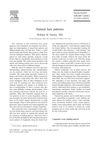 13 citations,
May 2004 in “Facial Plastic Surgery Clinics of North America”
13 citations,
May 2004 in “Facial Plastic Surgery Clinics of North America” Surgeons need to understand natural hair patterns for better hair restoration results.
 8 citations,
January 2020 in “Skin appendage disorders”
8 citations,
January 2020 in “Skin appendage disorders” Saw palmetto supplements may modestly improve hair regrowth with few side effects, but more research is needed.
 July 2024 in “Dermatology and Therapy”
July 2024 in “Dermatology and Therapy” Darker hair colors may increase the risk of alopecia areata, while lighter hair colors may decrease it.
 December 2023 in “Advances in economics, management and political sciences”
December 2023 in “Advances in economics, management and political sciences” Consumers prefer general hair care products over those specifically for hair loss.
 March 2011 in “Focus on surfactants”
March 2011 in “Focus on surfactants” Several companies launched new hair care ingredients in 2011 to improve conditioning, color retention, combability, and heat protection.
 December 2015 in “Biomedical and biopharmaceutical research”
December 2015 in “Biomedical and biopharmaceutical research” Argan oil makes hair care products spread better and improves their texture.
 1 citations,
January 2020 in “The Journal of Korean Medicine Ophthalmology and Otolaryngology and Dermatology”
1 citations,
January 2020 in “The Journal of Korean Medicine Ophthalmology and Otolaryngology and Dermatology” Traditional oriental hair care products and Yukmijihwang-huan improved hair loss symptoms in two older men.
 December 2020 in “International journal of research in ayurveda and pharmacy”
December 2020 in “International journal of research in ayurveda and pharmacy” Eating well and avoiding synthetic hair products are key for healthy hair.
 September 2015 in “SelfCare Journal”
September 2015 in “SelfCare Journal” Two treatments for male pattern hair loss are minoxidil and finasteride, but they have side effects and may not satisfy everyone.
 November 2021 in “Journal of pharmaceutical research international”
November 2021 in “Journal of pharmaceutical research international” Herbal depilatories are safer and cause fewer side effects than chemical ones for hair removal.
 1 citations,
February 2018 in “Madridge journal of dermatology & research”
1 citations,
February 2018 in “Madridge journal of dermatology & research” The plant extract remedy Satura® Rosta promotes hair growth and regrowth without negative effects.
 November 2023 in “Scholars journal of applied medical sciences”
November 2023 in “Scholars journal of applied medical sciences” Twelve plants, especially castor oil and coconut, are beneficial for managing afro-textured hair.
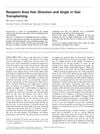 June 2004 in “Dermatologic Surgery”
June 2004 in “Dermatologic Surgery” Dr. Walter P. Unger suggests that copying a person's natural hair direction and angle during transplants leads to a more natural and fuller appearance.
























